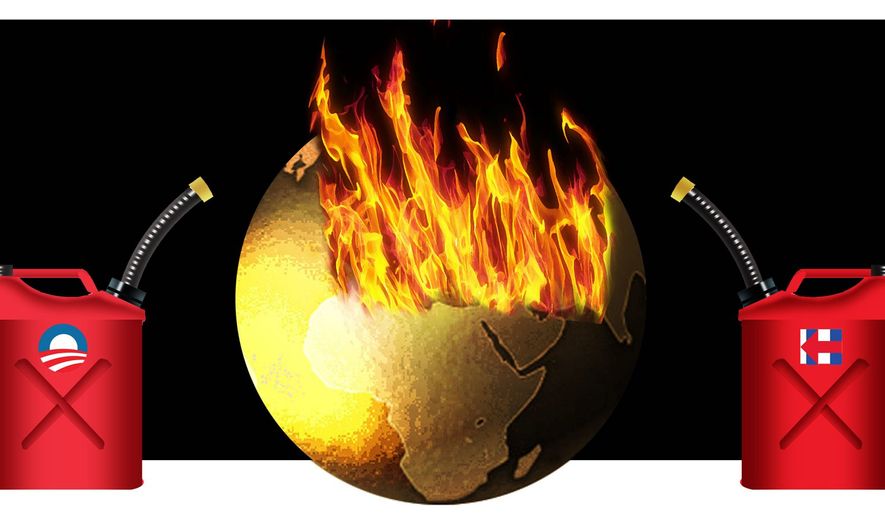OPINION:
When national security was the main concern of voters in past presidential elections, Republicans had a leg up. This was mostly because of the perceived and historical expertise Republicans had with national security matters, especially during the Cold War. Ronald Reagan was perhaps the best example — he brought an end to the Cold War while causing the Soviet Union to implode.
However, the George W. Bush administration changed this perception, primarily because of the protracted war and expensive occupation in Iraq. And by 2008, American voters were tired and frustrated as it appeared the Iraq War had no end — many thought it was another Vietnam.
Barack Obama, who basically ran on an “end the war” platform, was elected and “ended the war” simply by walking away from it. As a result, the entire Middle East came unglued with a series of amateurish policy and operational decisions directed from the Obama White House and Hillary Clinton’s State Department.
For example: While “leading from behind,” Mr. Obama and Mrs. Clinton knocked down the Moammar Gadhafi regime in Libya without a clue what to do in the region thereafter. The war in Syria spun out of control, the Russians intervened — and now we have “agreed” with them that President Bashar Assad can stay. We had no choice as the Russians are clearly calling the shots in Syria.
Then Iran got a windfall from Mr. Obama: Billions of dollars from us, and a “free pass” on their covert nuclear weapons program. This is extremely dangerous because their secret program could produce nuclear weapons that are actually used. Therefore, we would be at more practical risk of nuclear attack than we were during the Cold War.
Why? Traditional Cold War deterrence theories or mutually assured destruction concepts simply do not apply to jihadi terrorists. In fact, they much prefer to die for their radical beliefs. Recognizing this unpleasant reality, Russian President Vladimir Putin has even suggested that there could be a Russian nuclear response against the Islamic State, or ISIS.
Next has been a series of domestic terror attacks in Europe and the United States, all attributed to ISIS. We can expect more of these kinds of attacks, as ISIS is emboldened by the widespread fear they cause in our open and free society.
Political effects of the increased risk of domestic terror attacks are dramatic, both in Europe and the United States. For example, it’s becoming clear in our national polls that Americans of all political persuasions have rejected the Bush and Clinton “heir apparent” assumptions of both major party machines. Not only that, both national party leaderships seem woefully out of step with the disillusionment with which most Americans view their elected politicians — of either party — and the real effectiveness of our current “national security process.”
Accordingly, it seems clear that it won’t be “business as usual” in the 2016 national election — the person elected could easily be someone “outside the political mainstream.” Stated differently, it’s probably not going to be another Bush for the Republicans, although the Democratic Party’s machine seems unable to do anything other than back their corporate and endowed favorite, Hillary Clinton.
However, Mrs. Clinton is so closely aligned with the colossal national security failures of Barack Obama that many wonder whether she will be able to shake that damaging association in a national election. On the other side of the political spectrum, Jeb Bush clearly cannot shake his association and connection with the George W. Bush administration.
To have a real chance to win both the primary and the general election, an “outsider” candidate like Donald Trump must do two things: separate himself from the Bush administration and strongly associate Mrs. Clinton with the security failures of the Obama administration.
In fact, the Trump mantra for the remainder of his 2016 Republican primary campaign could easily be: “No more Bush, no more Clinton.”
Americans of all political persuasions feel threatened by ISIS, however, neither the Republican National Committee nor the Democratic National Committee “get’s it” yet. In addition, American voters do not typically give their politicians unlimited time to solve serious national security threats — both G.W. Bush and the Obama-Clinton team took way too long and have been held responsible for it.
Bottom Line: Donald Trump could win if he convinces voters that he will quickly and aggressively eliminate the terrorist threat to the American homeland from ISIS and destroy it overseas. Moreover, he must convince them that electing Mrs. Clinton means more ISIS attacks at home and an embarrassing continuation of failed Obama-Clinton policies in the Middle East.
• Daniel Gallington served in senior national security positions in the Office of the Secretary of Defense, the Department of Justice and as the last bipartisan general counsel for the U.S. Senate Select Committee on Intelligence.




Please read our comment policy before commenting.